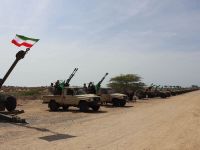ALBAWABA- The arrest of prominent pro-Houthi tribal figure Sheikh Mohammed Ahmed Al-Zaidi at the Sarafit border crossing between Yemen and Oman has triggered an unprecedented wave of tension in Al-Mahra, a governorate ruled by the internationally recognized Yemeni government.
Al-Zaidi, a senior tribal leader from Khawlan area, Sana'a governorate, was reportedly attempting to cross into Oman for medical treatment in Jordan when he was detained by Saudi-backed government forces.
The arrest immediately sparked an ambush by armed men believed to be affiliated with the "Sit-in Committee," led by the influential and anti-coalition tribal leader Sheikh Ali Salem Al-Harizi.
As a military convoy of 10 vehicles departed from Al-Ghayda to transfer Al-Zaidi, it was ambushed en route to Sarafit. The resulting clashes killed Brigadier General Abdullah bin Zayed, the mission commander, and injured several soldiers.
The confrontation also led to the complete shutdown of the Sarafit-Ghayda road, Al-Mahra’s main international route to Oman.
Tensions escalated further as armed men allegedly loyal to Houthis reportedly set up new checkpoints along the route, and armed tribal groups seized strategic highlands to block government reinforcements.
Field sources confirmed that the road remains closed, and the detained tribal sheikh has not yet been transferred from the Sarafit area due to ongoing armed resistance.
Rashad Al-Alimi, head of the Presidential Leadership Council, internationally recognized, convened an emergency meeting in Al-Mahra with defense and local officials to address the deteriorating security and discuss service restoration, project progress, and climate recovery efforts.
Despite government efforts, the situation remains volatile. Local sources report that Omani officials may be mediating to prevent further escalation, as fears grow that loyalist tribes, especially those aligned with Sheikh Al-Harizi and sympathetic to Al-Zaidi, may expand the conflict.
Critics argue the arrest risks dragging Al-Mahra, long considered a neutral and safe zone for patients and travelers, into the broader Yemen conflict.
The area has until now largely remained outside the direct fighting, and many view this arrest as a dangerous shift toward militarizing one of Yemen’s last functioning humanitarian corridors.











